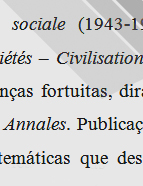

................................
As Godinho declares in a letter to Lucien Febvre in 1946, it was under the influence of the Annales that his spirit of debutant historian was formed (Godinho, Do ofício, p. 107). In fact, almost immediately afterwards, when he was already in Paris, he made six contributions to the journal between 1948 and 1950, and very few other Portuguese names appeared in the Annales between 1948 (there were none prior to this date) and 1975: besides Magalhães Godinho (1918-2011), Alfredo Margarido (1928-2010) offered 7 contributions between 1970 and 1974, António José Saraiva (1917-1993) 5 contributions between 1967 and 1970, Miriam Halpern Pereira (1937) 1 contribution later in 1975, Joel Serrão (1919-2008) also contributed once in 1954 and José Gentil Pires da Silva (1922) made 9 contributions to the journal between 1961 and 1971.
All of them, with the exception of Joel Serrão, spent long periods or extended stays in France and were in very close contact with French historians and historiography. These Portuguese writers established close connections with that already mythical journal - and it should be noted that Magalhães Godinho was actually a historian of the French school - a direct disciple of Lucien Febvre and Fernand Braudel (from 1947 to 1960) - therefore, Lucien Febvre was in a position to write that his vision had broadened as a result of being in Paris and in contact with the milieu of the Annales. (Godinho, Do oficio, p. 184). Additionally, Gentil da Silva was a very close disciple of Braudel, who published his several volumes on business strategy in Lisbon from the 16th -18th centuries and under whom he obtained his doctorate with a thesis on banking and credit in Italy in the 16th century. He remained in France to teach at the university of Nice and went on to do little or nothing to intervene in the history that was being made in his country of origin.
In the end, some of the innovations and creations that were changing the course of the history being researched, written and taught in the most advanced circles in Europe, finally reached Portugal. It is a pity that a more timely and greater influence could not have been awakened in the academic environment by such a stimulating, broad and enriching History, which sought to be "scientifically conducted knowledge", according to the wise lesson of Lucien Febvre. These influences would be greatly developed with the new organizations and new teaching staff of the History degrees from 1974 onwards.
